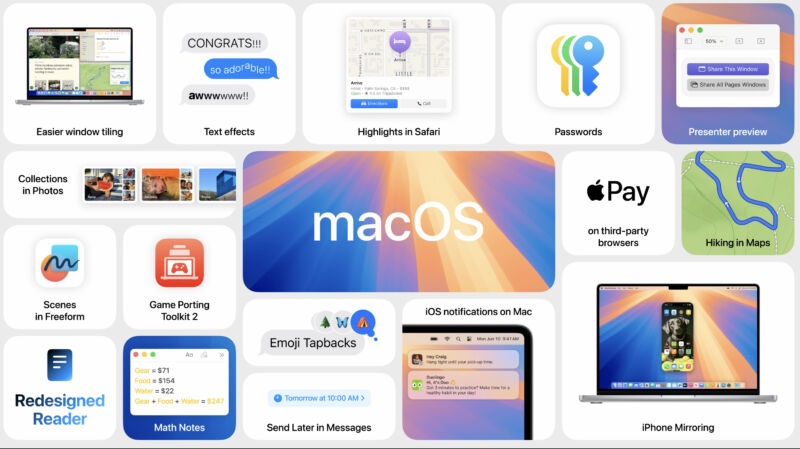Intel Macs hold on —
With one major exception, Sequoia will run on everything that can run Sonoma.

Enlarge / A grab bag of new features in macOS 15 Sequoia.
Apple
Most owners of aging Intel Macs got a bit of a reprieve today when Apple announced macOS 15 Sequoia—this new macOS release will run on the vast majority of the hardware that can currently run macOS 14 Sonoma. Intel Macs released between December of 2017 and 2020 are mostly eligible for the new update, though newer models with Apple Silicon chips will be needed to support some of the new features.
Apple’s full support list for Sequoia is as follows:

Enlarge / The support list for macOS 15 Sequoia.
Apple
Generally, all of these Macs include Apple’s T2 chip, a co-processor installed in late-model Intel Macs that bridged the gap between the Intel and Apple Silicon eras. There are two exceptions: The biggest is the 2018 MacBook Air, which did come with an Apple T2 but also shipped with a weak dual-core processor and integrated GPU that Apple has apparently decided aren’t up to the task of handling Sequoia. The other is the 2019 iMac, which for whatever reason shipped without a T2. Apple says that the iPhone mirroring feature does require the T2 chip, so it presumably won’t work on the 2019 iMac.
The Apple Intelligence AI features will all require an Apple Silicon Mac—it will run on anything with an M1 chip or newer. Live audio transcription in the Notes app will also require an Apple Silicon chip.
Apple hasn’t said exactly when it plans to stop releasing new macOS updates for Intel Macs, but based on its current pace, Sequoia could be the end of the line. Whatever Apple decides to do next year, Intel Macs without an Apple T2 are definitively in the company’s rear-view mirror.